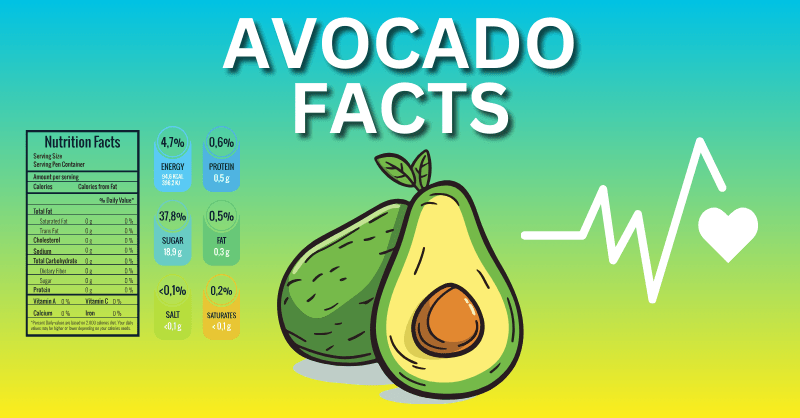Avocado Nutrition Facts: Health Benefits Unveiled
When it comes to avocado nutrition facts, they are loaded with goodness. A 100g serving of avocado contains 160 calories, making it a satisfying addition to your meals. Avocados are also rich in vitamins C, E, K, and B6, as well as riboflavin, niacin, folate, pantothenic acid, magnesium, and potassium.
But that’s not all! Avocados also provide lutein, beta carotene, and omega-3 fatty acids. These nutrients contribute to overall wellbeing and support various bodily functions.
Eating avocados as part of a balanced diet can offer numerous health benefits. From promoting heart health to aiding in vision, preventing osteoporosis to potentially preventing certain types of cancer, avocados are truly a superfood.
Not only that, but avocados are especially beneficial for pregnant women as they provide important nutrients for fetal development.
Adding avocados to your diet can also help reduce the risk of depression, improve digestion, support natural detoxification, and provide relief for osteoarthritis. Additionally, avocados possess antimicrobial properties.
The key takeaway is that avocados offer a nutritional powerhouse that can enhance your overall health and wellbeing when enjoyed as part of a balanced diet.
Key Takeaways:
- Avocados are nutrient-dense and provide essential vitamins and minerals.
- They contain healthy fats that can help maintain stable blood sugar levels and support overall health.
- Avocados offer numerous health benefits, including promoting heart health, aiding in vision, and preventing osteoporosis.
- They are beneficial for pregnant women as they provide essential nutrients for fetal development.
- Including avocados in a balanced diet can contribute to overall health and wellbeing.
Avocado Nutrition Facts
| Nutrient | Amount per 100g | Benefits |
|---|---|---|
| Calories | 160 kcal | Provides energy |
| Fat | 15 g | Rich in healthy fats |
| Carbohydrates | 9 g | Good source of dietary fiber |
| Protein | 2 g | Offers plant-based protein |
| Fiber | 7 g | Supports digestive health |
| Vitamin K | 21 mcg | Promotes blood clotting |
| Vitamin C | 10 mg | Acts as an antioxidant |
| Folate | 81 mcg | Supports fetal development |
| Potassium | 485 mg | Helps maintain heart health |
| Vitamin E | 2 mg | Supports skin health |
| Magnesium | 29 mg | Supports nerve and muscle function |
Avocados and Heart Health
Avocados have been known to have a positive impact on heart health. One of the key components of avocados is a natural plant sterol called beta-sitosterol, which has been shown to help maintain healthy cholesterol levels. Regularly incorporating avocados and other plant sterol-rich foods into your diet can contribute to heart health.
In addition to plant sterols, avocados are high in monounsaturated fats, which are known to improve cholesterol levels and reduce the risk of cardiovascular diseases. These healthy fats found in avocados can help lower bad cholesterol (LDL) levels while maintaining or increasing good cholesterol (HDL) levels.
By including avocados in a balanced diet, you can promote heart health and support overall cardiovascular well-being. Avocado consumption can play a role in maintaining healthy cholesterol levels and reducing the risk of heart-related conditions.
Avocados and Eye Health
Avocados contain lutein and zeaxanthin, two phytochemicals that are beneficial for eye health. These compounds provide antioxidant protection and help minimize damage, including damage from UV light. Avocados’ monounsaturated fats also assist in the absorption of other fat-soluble antioxidants, such as beta carotene.
Adding avocados to the diet may help reduce the risk of age-related macular degeneration and support overall eye health. Consuming avocados regularly can contribute to maintaining good vision and protecting the eyes from oxidative stress.
Avocados and Bone Health
Avocados have long been associated with numerous health benefits, and their positive impact on bone health is no exception. One of the key nutrients found in avocados is vitamin K, which plays a vital role in maintaining strong and healthy bones.
Vitamin K is known for its ability to support bone health by enhancing calcium absorption and reducing the excretion of calcium through urine. Adequate intake of vitamin K can help prevent bone loss, improve bone density, and reduce the risk of fractures.
Half of an avocado provides approximately 18% of the daily recommended value of vitamin K, making it a convenient and delicious source of this essential nutrient.
Avocados also contain other essential nutrients, such as vitamin C, vitamin E, potassium, and magnesium, which contribute to overall bone health.
Avocado minerals, such as calcium, magnesium, and potassium, play a crucial role in maintaining strong and healthy bones. Calcium is a well-known mineral that is essential for bone health, aiding in the formation and maintenance of bone tissue. Magnesium is another mineral that works synergistically with calcium, promoting its absorption and utilization in the body. Potassium, on the other hand, helps neutralize acids that can lead to bone loss.
In addition to their bone-enhancing properties, avocados offer numerous other health benefits. Avocado fats, such as monounsaturated and polyunsaturated fats, have been shown to reduce inflammation, support heart health, and improve cholesterol levels. Avocados are also packed with fiber, which aids in digestion and helps regulate blood sugar levels.
Avocado Protein
Avocado, often referred to as a superfood, is not only known for its creamy texture and delicious taste but also for its impressive nutritional profile. One of the main reasons why avocado has gained such popularity amongst health enthusiasts is its significant protein content. Yes, you read it right – avocado is a great source of plant-based protein.
When it comes to avocado protein, it may not be as high as in animal-based sources, but it can still contribute to your daily protein needs. An average-sized avocado contains approximately 2 grams of protein. While this may not seem like a lot, when combined with other protein sources throughout the day, avocado can be a valuable addition to a well-rounded diet.
Conclusion
Avocados, with their nutrient-dense composition and rich content of vitamins, minerals, and healthy fats, are a valuable addition to a balanced diet. They offer numerous health benefits, including promoting heart health, supporting eye health, aiding in bone health, and potentially preventing certain types of cancer. Avocados are also beneficial for fetal health during pregnancy.
In addition to these advantages, avocados can help reduce the risk of depression, support natural detoxification, improve digestion, and provide relief for osteoarthritis. They also possess antimicrobial properties. Including avocados in daily meals is a delicious way to enhance nutrient intake and support overall health and wellbeing.
Considering the avocado’s nutritional value and wide range of health benefits, it is clear that this versatile fruit is worth incorporating into one’s diet. Whether enjoyed as a topping on toast, blended into a smoothie, or as a creamy addition to salads, avocados contribute to a healthy lifestyle and can help individuals achieve their nutritional goals.
FAQ
What are the avocado nutrition facts?
Avocados are rich in vitamins, minerals, and healthy fats. They contain vitamins C, E, K, and B6, as well as riboflavin, niacin, folate, pantothenic acid, magnesium, and potassium. Avocados also provide lutein, beta carotene, and omega-3 fatty acids. A 100g serving of avocado contains 160 calories, 14.7g of fat, 8.5g of carbohydrates, 6.7g of fiber, and less than 1g of sugar.
What are the health benefits of avocados?
Avocados offer numerous health benefits. They promote heart health, aid in vision, prevent osteoporosis, and potentially prevent certain types of cancer. They are also beneficial for pregnant women, as they provide important nutrients for fetal development. Avocados may help reduce the risk of depression, improve digestion, support natural detoxification, provide relief for osteoarthritis, and offer antimicrobial properties. Including avocados in a balanced diet can contribute to overall health and wellbeing.
How do avocados support heart health?
Avocados contain a natural plant sterol called beta-sitosterol, which may help maintain healthy cholesterol levels. The monounsaturated fats in avocados can help improve cholesterol levels and reduce the risk of cardiovascular diseases. Including avocados in a balanced diet can promote heart health and support overall cardiovascular wellbeing.
How do avocados benefit eye health?
Avocados contain lutein and zeaxanthin, two phytochemicals that are beneficial for eye health. These compounds provide antioxidant protection and help minimize damage, including damage from UV light. Adding avocados to the diet may help reduce the risk of age-related macular degeneration and support overall eye health.
How do avocados support bone health?
Avocados contain vitamin K, which plays a crucial role in bone health. Adequate intake of vitamin K can support bone health by increasing calcium absorption and reducing the urinary excretion of calcium. Including avocados in a balanced diet can help prevent bone loss and support overall bone health.
What is the conclusion regarding avocado nutrition and health benefits?
Avocados offer a wide range of health benefits due to their nutrient-dense composition. They are rich in vitamins, minerals, and healthy fats, making them an excellent addition to a balanced diet. Avocados provide numerous health advantages, including promoting heart health, supporting eye health, aiding in bone health, and potentially preventing certain types of cancer. They are also beneficial for fetal health during pregnancy. Avocados can help reduce the risk of depression, improve digestion, support natural detoxification, provide relief for osteoarthritis, and offer antimicrobial properties. Incorporating avocados into daily meals is a delicious way to enhance nutrient intake and support overall health and wellbeing.


